Publications
Reports & SubmissionsIMADR publishes guidebooks related to ICERD and/or CERD and books on our areas of focus. Discover our books and guidebooks by filtering your search. * IMADR books are available for purchase.

ICERD and CERD: A Guide for Civil Society Actors
We published ICERD and CERD: A Guide for Civil Society Actors, consisting of three substantial parts: the first part on the Convention, the second one on the Committee and its work, and the third part on how civil society actors can or should engage with them.
Learn more

